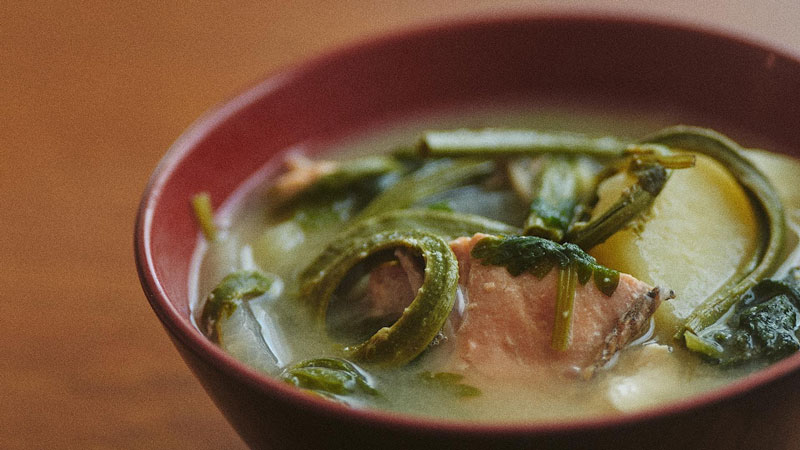
A Taste of Ainu Food Culture
- 24 - 26 February 2024
- 24 & 25 February: 15:00 - 16:30, 26 Febuary: 18:30 - 20:00
- The Hall, Japan House London, 101-111 Kensington High Street, London, W8 5SA
- https://www.japanhouselondon.uk/whats-on/a-taste-of-ainu-food-culture/
- +44 (0)20 7932 7100
- info@japanhouselondon.uk
- Tweet
Discover the characteristics and ingredients of Ainu food culture from the Saru River region and sample one of Ainu cookery’s signature dishes by joining one of a series of special talks, demonstrations and tasting sessions led by members of the Biratori Ainu Culture Preservation Association.
During each event in this series, Oikawa Naomi and Nagano Tamaki introduce the ingredients and principles of Ainu food culture and demonstrate how to make ohaw, a soup made by simmering meat or fish in a base of wild seasonal vegetables. Guests then have the opportunity to try the dish themselves. On 24 and 26 February, guests can choose between a sample portion of cepohaw (ohaw with salmon) or vegan kinaohaw (ohaw with wild vegetables) and on 25 February, between yukohaw (ohaw with venison) and vegan kinaohaw. Please choose which type of ohaw you would like to sample at the point of booking.
The cuisine of the Ainu, an indigenous people of northern Japan, is distinct from other parts of the Japanese archipelago. Its key ingredients are local game and fish obtained through fishing and hunting such as salmon and deer, seasonal wild plants foraged in the mountains as well as various millets and root vegetables obtained through farming. Imbued with a strong respect for the sustainable use of resources and the environment, an important principle of Ainu food culture is only to take what you need and, when harvesting mountain vegetables, always to ensure that the roots remain.
Following a period of decline in Ainu culinary traditions, as a result of assimilationist policies and drastic changes in agriculture since the late 19th century, there has been in recent years a resurgence of interest in the traditions, ingredients and techniques of Ainu cuisine. Vital to this revitalization are organizations like the Biratori Ainu Culture Preservation Association which aim to preserve Ainu food traditions for future generations by leading Ainu cooking workshops and compiling Ainu recipes and adapting them to contemporary tastes.
Tickets for the event are non-refundable. Please read our Terms and Conditions for Event Tickets before purchasing your ticket.
Please note that filming and photography may take place at this event. Photos and footage of the event may then be used to promote Japan House London, helping more people to discover what we offer. If you have any concerns, please email info@japanhouselondon.uk or contact a member of the team on site.
The exhibition Ainu Stories: Contemporary Lives by the Saru River is on display in the Gallery at Japan House London until 21 April, 2024.
About the Speakers
Oikawa Naomi
Born in 1969, for the last 20 years Oikawa has been researching Ainu food culture at the Ainu Cultural Environment Conservation Research Office in the Ainu Policy Promotion Section of Biratori Town Office. Her work involves the gathering of ingredients and cultivation of millets as well as the creation of recipes and manuals to pass on Ainu food culture to future generations. She is also responsible for promoting Ainu food culture within the Biratori Ainu Culture Preservation Association where she holds workshops on Ainu cooking several times a year for Biratori residents and visitors. During the Tokyo 2020 Olympic and Paralympic Games, she was selected as sub leader of the Ainu dance performance and was in charge of the upopo song performance during the opening ceremonies of the marathon and race-walk events held in Sapporo.
Nagano Tamaki
Born in Nibutani in 1963, Nagano Tamaki joined the Biratori Ainu Culture Preservation Association after her children began attending Ainu language classes in 1993. After serving as an officer, treasurer, and secretary general, she became the chair of the Biratori Ainu Culture Preservation Association in 2022. She has a deep passion for performing Ainu dance despite her reluctance to appear in public since childhood. Within the Association, she prefers to provide support behind the scenes for its members rather than appearing on a stage herself. Since 2005, Nagano has been actively involved in researching cultural conservation measures for the Biratori Dam area. From 2012 onward, she has taken on a leadership role in the research activities. Currently, she is dedicated to conducting surveys related to the impact of river channel excavation work.
